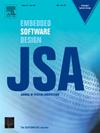Efficient Dropout-resilient and Verifiable Federated learning scheme for AIoT healthcare system
IF 4.1
2区 计算机科学
Q1 COMPUTER SCIENCE, HARDWARE & ARCHITECTURE
引用次数: 0
Abstract
Federated learning (FL) with healthcare AIoT data from multiple healthcare institutions can enhance device intelligence and further protect people’s health. The preservation of confidentiality in healthcare data has emerged as a central concern in healthcare FL systems. Under the premise of emphasizing privacy protection, it is particularly inefficient to maintain system robustness after a participant drops out. Furthermore, it proves more complex to confirm whether the aggregation server faithfully executes the aggregation task, especially given that the aggregation server may collude with corrupt users to intentionally return carefully crafted aggregation results. At present, few works focus on the two issues concurrently. To address this challenge, an efficient dropout-resilient and verifiable FL scheme (EDV-FL for short) is proposed in this paper. Our scheme addresses the issue of dropped users rejoining in the future, while reducing both communication and computation overhead. Moreover, we ensure that even if the server colludes with corrupt users to forge the aggregation result, users can still detect the correctness of the aggregation result. We theoretically demonstrate the effectiveness of EDV-FL and reproduce the scheme using Convolutional Neural Network (CNN) models on the MNIST, CIFAR-10, and Fashion-MNIST datasets. Theoretical proofs and experimental analyses show that our EDV-FL is an efficient, dropout-resistant, and collusion-resistant, verifiable FL scheme.
面向AIoT医疗系统的高效抗辍学可验证联邦学习方案
使用来自多个医疗保健机构的医疗保健AIoT数据的联邦学习(FL)可以增强设备智能并进一步保护人们的健康。医疗保健数据的保密性已成为医疗保健FL系统的核心问题。在强调隐私保护的前提下,在参与者退出后保持系统的鲁棒性效率特别低。此外,确认聚合服务器是否忠实地执行聚合任务更为复杂,特别是考虑到聚合服务器可能与腐败的用户勾结,故意返回精心制作的聚合结果。目前,很少有作品同时关注这两个问题。为了解决这一问题,本文提出了一种高效的抗辍学可验证的FL方案(简称EDV-FL)。我们的方案解决了将来丢失用户重新加入的问题,同时减少了通信和计算开销。此外,我们保证即使服务器与恶意用户串通伪造聚合结果,用户仍然可以检测到聚合结果的正确性。我们从理论上证明了EDV-FL的有效性,并使用卷积神经网络(CNN)模型在MNIST、CIFAR-10和时尚-MNIST数据集上重现了该方案。理论证明和实验分析表明,我们的EDV-FL方案是一种高效、抗辍学、抗合谋、可验证的FL方案。
本文章由计算机程序翻译,如有差异,请以英文原文为准。
求助全文
约1分钟内获得全文
求助全文
来源期刊

Journal of Systems Architecture
工程技术-计算机:硬件
CiteScore
8.70
自引率
15.60%
发文量
226
审稿时长
46 days
期刊介绍:
The Journal of Systems Architecture: Embedded Software Design (JSA) is a journal covering all design and architectural aspects related to embedded systems and software. It ranges from the microarchitecture level via the system software level up to the application-specific architecture level. Aspects such as real-time systems, operating systems, FPGA programming, programming languages, communications (limited to analysis and the software stack), mobile systems, parallel and distributed architectures as well as additional subjects in the computer and system architecture area will fall within the scope of this journal. Technology will not be a main focus, but its use and relevance to particular designs will be. Case studies are welcome but must contribute more than just a design for a particular piece of software.
Design automation of such systems including methodologies, techniques and tools for their design as well as novel designs of software components fall within the scope of this journal. Novel applications that use embedded systems are also central in this journal. While hardware is not a part of this journal hardware/software co-design methods that consider interplay between software and hardware components with and emphasis on software are also relevant here.
 求助内容:
求助内容: 应助结果提醒方式:
应助结果提醒方式:


